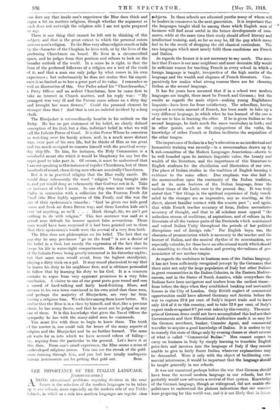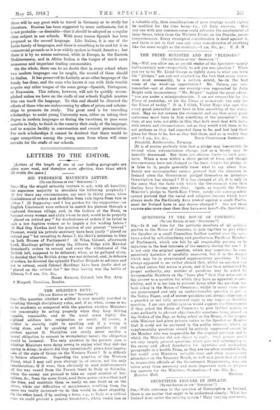THE IMPORTANCE OF THE ITALIAN LANGUAGE.
[C01.131IINICATED.]
A 3.IONG educational problems requiring decision in the near future is the selection of the modern languages to be taken up in our schools, more especially on the modern side of our Public Schools, in which as a rule two modern languages are regular class subjects. In these schools are educated youths many of whom will be leaders in commerce in the next generation. It is important that the languages taught shall be among those which English men of business will find most useful in the future developments of com- merce, while at the same time their study should afford literary and intellectual training, and, so fax as may be, fill the gap which many feel to be the result of dropping the old classical curriculum. The two languages which most nearly fulfil these conditions are French and Italian.
As regards the former it is not necessary to say much. The mere fact that France is our near neighbour and most desirable Ally would be sufficient reason for teaching French in every school in which a foreign language is taught, irrespective of the high merits of the language and the wealth and elegance of French literature. Com- paratively few realize what strong reasons 'there are for choosing Italian as the second language.
It has for years been assumed that if in a school two modern languages are taught, these must be French and German ; but the results as regards the main object—making young Englishmen linguists—have been far from satisfactory. The schoolboy, having acquired a certain amount of French, has been made to take up a very different language, in which what he has learned of the one is of no use to him in learning the other. If he is given Italian as the second language, he finds much the same vocabulary in both; and in other points, such as the conjugations of the verbs, the knowledge of either French or Italian facilitates the acquisition of the other tongue.
The importance of Italian in a boy's education as an intellectual and humanistic training was recently—in a memorandum drawn up by Is sub-committee of the Modern Languages Association—shown to be well founded upon its intrinsic linguistic value, the beauty and wealth of the literature, and the importance of this literature to English students for the elucidation and illustration of our own. The place of Italian studies in the tradition of English learning is evidence to the same effect. Due emphasis was also laid in the memorandum upon the continuity of the Italian tradition, and in its main features of the Italian language, from the earliest times of the Latin race to the present day. It was truly stated that " few things in the spiritual experience of Italy vouch- safed to the stranger are as impressive, nay as startling,' as this direct, almost familiar contact with the remote past " ; and again, that while French teaches accuracy of form, Italian necessitates accuracy of thought, and that to all scholars must appeal " the unbroken stream of traditions, of aspirations, and of culture in the literature of all the various parts of the Peninsula which maintained and voiced Italian Unity throughout the periods of her political disruptions and of foreign rule." For English boys, too, the clearness of pronunciation which is necessary to the teacher and the learner of Italian, and the musical rhythm of its accentuation, are especially valuable, for these have an educational worth which should do something to check the modern and growing slovenliness of pro- nunciation of our mother-tongue.
As regards the usefulness to business men of the Italian language, it has not been sufficiently recognized (except by the Germans) that there exist not onlysthe large population of Italy but other Italians in great communities in the Italian Colonies, in the Eastern Mediter- ranean, and in the States of South America, while everywhere the Italians have been navigators and traders from the earliest times— from before the days when they established banking and mercantile houses in the City of London. Only British neglect of commercial opportunities could have allowed Germany and Austria before the war to capture 25.8 per cent. of Italy's import trade and to leave only 15.6 of it to this country, and to take 22.9 per cent. of Italy's export trade as against 91 per cent. taken by this country. The enter- prise of German firms could not have accomplished this had not their Governments and their Educational Authorities made it so easy for the German merchant, banker, Consular Agent, and commercial traveller to acquire a good knowledge of Italian. It is useless to try to remedy this state of things only by evening classes or short courses of what is called " Commercial Italian." Men cannot expect to carry on business in Italy by simply learning to translate English price-lists and invoices into the language of Italy if they remain unable to give in fairly fluent Italian whatever explanations may be demanded. Were it only with the object of facilitating com- mercial intercourse, it would be important that the language should be taught generally in our schools.
It was not unnatural perhaps before the war that German should have been the second modern language in our schools, but few probably would now advocate a revival of that system. Knowledge of the German language, though so widespread, did not enable dur politicians to understand the plainest indications that our enemies were preparing for this world-war, and it is not likely that in future there will be any great wish to travel in Germany or to study her literature. Russian has been suggested by some enthusiasts, but it is not probable—or desirable—that it should be adopted as a regular class subject in our schools. With more reason Spanish has been proposed as the second language. Like Italian, it is one of the Latin family of languages, and there is something to be said for it on commercial grounds as it is so widely spoken in South America ; but there it is by no means universal, while in Europe, in the Eastern Mediterranean, and in Africa Italian is the tongue of much more numerous and important trading communities.
On the whole, there can be no doubt that in every school where two modem languages can be taught, the second of these should be Italian. It has preserved its Latinity as no other language of the family has done, and the man who knows it can with little trouble acquire any other tongue of the same group—Spanish, Portuguese, or Rumanian. This reform, however, will not be quickly accom- plished unless we have on the staffs of our schools English masters who can teach the language. To this end should be directed the efforts of those who are endeavouring by offers of prizes and scholar- ships to promote its study. The great need is for travelling scholarships to assist young University men, either on taking their degree in modem languages or during the vacations, to pass some months in Italy, to finish in the country their study of the language, and to acquire facility in conversation and correct pronunciation. For such scholarships it cannot be doubted that there would be eager competitors among the young men from whom will come recruits for the staffs of our schools.



























 Previous page
Previous page